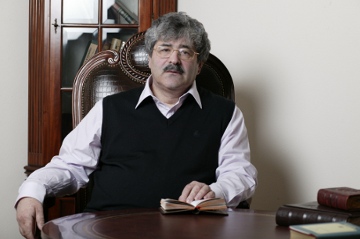
Inaugurated as the US Ambassador to Moscow, John Tefft said that a key part of his mission would be to interpret the Russian position for the White House. One does have to gain relevant insight before interpreting starts to make sense. It may cost serious inner efforts, but otherwise there is a risk that the Ambassador might recycle Washington's own arguments with minimal variations and that the much-needed communication degenerates into talking to oneself in the mirror.
Up to date the statements made by Ambassador Tefft have appeared to be completely reducible to the standard postulates of the US diplomacy. The only exception on record was his expressing a bold view that Russia “also won” rather than lost as a result of the NATO expansion to the east. Mr. Tefft signaled a measure of first-hand familiarity with the Russian realia by adding “I know that in Russia, some believe otherwise”, but, in fact, the inescapable conclusion based on opinion polls is that the vast majority of Russians, not just “some” of them, see NATO expansion as a security threat.
Ambassador Tefft cited Henry Kissinger in a recent interview, reasonably assuming that Mr. Kissinger commands wide respect in Russia. “I read an interview with Henry Kissinger in which he criticized the sanctions, but at the same time, he made it absolutely clear that you cannot "cut away" a piece of other country with impunity, no matter for what historical reasons. And in the Crimea, that is exactly what happened”, wrote Tefft. It should be noted, though, that Crimea would have become a part of Russia much earlier than in 2014 if the reasons behind Moscow's decisions on the issue were of abstractly historical character. History in a general sense undoubtedly loomed through Moscow's motivation as a background factor, but it was the current twist of historical destiny that prompted the move to repatriate Crimea.
Ambassador Tefft is certainly aware that his claim about NATO expansion somehow benefiting Russia at most sells as a paradox. Yet, a paradox reflecting an absolutely real situation arises in connection with the Crimean developments. If the purpose was to avert a bloodbath and a humanitarian disaster like those suffered later by Donbass, the West should have more than just backed Russia's reunion with Crimea – it should have urged Moscow to incorporate the region.
Suppose Ambassador Tefft could press an undo button to reverse history. Knowing that a series of cancellations would ultimately cause things to revert to the condition under which the Crimean population – a total of over a million people – would be plunged into chaos and a civil war with massive fatalities, he would, as I believe, refrain from ever touching the button. Luckily, in any case the world is free of such magic.
Malcolm Rifkind, the British Parliament's Intelligence and Security Committee Chairman who also served as the Secretary of State and the Defense Secretary under conservative cabinets, maintains that the referendum in Scotland sets a generic example of smooth handling of divisive issues. It is amazing how the British politician stays oblivious to the simple truth that historical dynamics in various parts of the world gives rise to extremely different levels of pressure and risk. Russia's interests were not at stake in the case of Crimea – the people across the region would have been exposed to lethal danger if Moscow had been slow to respond.
An eloquent document gives a glimpse of what the future could have held for Crimea if it had fallen under the control of the Maidan leaders who, months later, left a trail of inhumane offensives in the east of Ukraine. The text – a de facto mandate to followers by Dmytro Yarosh,leader of the Right Sector group of ultranationalist militants and a parliamentarian in today's Ukraine - reads: “We want no Russians in Crimea as they will never join us in eulogizing Bandera, or favor our Greek Catholic religion, our history of insurgency movements, and our language. Russians will always love and respect Russia, they are impossible to assimilate. Therefore, the Russian people must be done away with or expelled from Crimea for Ukraine to rise. I would rather see Crimea in the hands of Tatars.”
A sober assessment of the situation in and around Crimea shows with utmost clarity that the civil war on the peninsula would have been even more ferocious than the current conflict in Donbass. The fighting would have left the blooming region in ruins, with thousands of people killed or crippled.
The sort of logic pursued by Tefft, Rifkind, and the chorus of politicians in the West evokes the imagery of “the last chosen” from Russian philosopher Sergei Bulgakov's “No Plan”: “Countless living individuals are to face fatal hardships and painful deaths in the name of happiness of the last chosen, and those are supposed to accept the sacrifice self-righteously and without remorse”. It is hard to get rid of the impression that these days we witness a recurrence of the practice of human sacrifices, but there is more than that. Pharisees and lawyers kept an eye on Jesus to find out if he would heal on Sabbath, the day on which any works were deemed unlawful. Christ condemned the scribes and Pharisees and went ahead with healing, helping sufferers, causing those around to rejoice but leaving Pharisees, whose indifference was thus unmasked, in fury and indignation. As for the Pharisees, they had to face the moral verdict pronounced publicly: “You blind guides! You strain out a gnat but swallow a camel (Matthew 23:24)”.
Published as a part of the RIA Novosti Authors project
read more in our Telegram-channel https://t.me/The_International_Affairs

 7:49 28.11.2014 •
7:49 28.11.2014 •






















